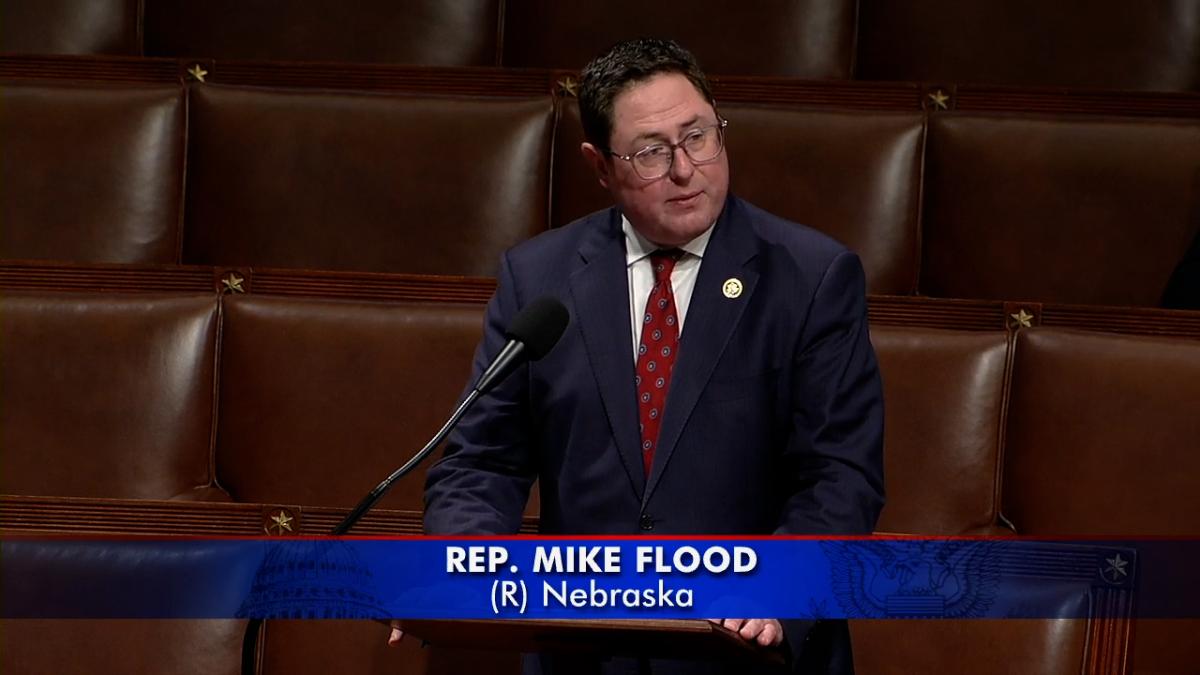Congressman Flood: It's Time to Repeal the SEC's SAB 121

WASHINGTON, D.C. – Today, U.S. Congressman Mike Flood delivered remarks during debate on H.J. Res. 109, a measure that repeals the U.S. Securities and Exchange Commission’s (SEC) Staff Accounting Bulletin 121, also known as SAB 121.
Video of Rep. Flood’s comments can be found here. A transcript of his remarks can be found below.
Mr. Speaker, I’m pleased to speak in support of my bipartisan Resolution, H.J. Res. 109, a Congressional Review Act resolution for the SEC’s Staff Accounting Bulletin 121, or “SAB 121” for short.
I’d like to start by thanking Congressman Nickel and Senator Lummis for working with me on this resolution, and for the Chairman’s leadership in getting this to the Floor.
This is something of a complicated issue as you’ve heard today, so I’ll break it down in a few different components:
First, let me begin by briefly explaining what a staff accounting bulletin is. Staff accounting bulletins are technical accounting guidance for public entities.
They’re typically non-controversial in nature and, importantly for this debate, they are not rules. Guidance is not supposed to dictate a major change in policy. That’s what our notice-and-comment rulemaking process is for.
This specific bulletin effectively requires banks to put digital assets held in custody on their balance sheet. Simply put, that’s not how custody usually works. As the Federal Reserve Chairman once said, “custody assets are off-balance sheet, always have been.” That’s a quote.
This bulletin upends custodial practice for banks, and it effectively keeps banks out of this market entirely. That’s not good for consumers or investors.
Next, let’s talk about the processes. The Chairman has already mentioned, there were two major process fouls by the SEC issuance of SAB 121:
1. The SEC is not a bank regulator and SAB 121 affects a core banking activity: custody. Yet, the SEC issued this Bulletin without even talking to the regulators first. Think about that. The SEC issued this without even talking to the prudential regulators. That’s an incredible oversight—particularly given the Bulletin’s unusual treatment of custodial assets.
2. The nonpartisan Government Accountability Office determined that this Bulletin is effectively a rule. In other words, the SEC got caught trying to circumvent the APA and the due diligence requirements that come with it.
Now let’s talk about solutions: The easiest way to fix this problem is for the SEC to simply rescind the Bulletin themselves and work with the prudential regulators on an alternate solution.
Despite the fact that this Bulletin was issued through a faulty process, and despite the negative ramifications of keeping banks from taking custody of retail investor assets, the SEC has been unwilling to have any conversation about making changes.
That leaves us with no choice: Congress needs to act through the Congressional Review Act to rescind SAB 121.
Finally, let me briefly address an argument that Ranking Member Waters and some of my Democratic colleagues have made on this issue.
I’ve heard this argument that the CRA should not be applied to an accounting bulletin. But let’s contemplate the alternative: What are the implications if we fail to pass this resolution?
This is an instance where the nonpartisan GAO outright said the SEC circumvented the proper regulatory process.
Think about why the Congressional Review Act was passed in the first place—to give Congress the ability to check a regulator that has gone astray. If we don’t pass this resolution, we are effectively giving the green light to our regulators to bypass the APA rulemaking process with immunity. This isn’t just about the SEC or bank custody—this is about providing a necessary check to Executive Branch power.
Regardless of your feelings on banking policy or the SEC—I urge you to support this resolution for the sake of upholding the authority of the institution we serve in.
Before I yield back, I would ask, Mr. Speaker, unanimous consent to insert four letters into the record.
Number one is a letter dated April 27, 2023, sent by Fed. Vice Chair Michael Barr to Senator Lummis discussing the impact of SAB 121 on federal related financial institutions.
Number two, a letter dated April 18th, 2023, sent by FDIC Chairman Gruenberg to Chairman McHenry and Senator Lummis in response to their March 2023 letter.
Number three, a letter dated February 28, 2024, sent by the Conference of State Bank Supervisors to Chairman McHenry and Ranking Member Waters outlining the unintended effects of SAB 121 that it could pose on customers, consumers, and markets.
And the fourth letter is dated February 29, 2024, sent by the American Bankers Association to Chairman McHenry and Ranking Member Waters expressing support for H.J Res. 109.
With that, I yield back.